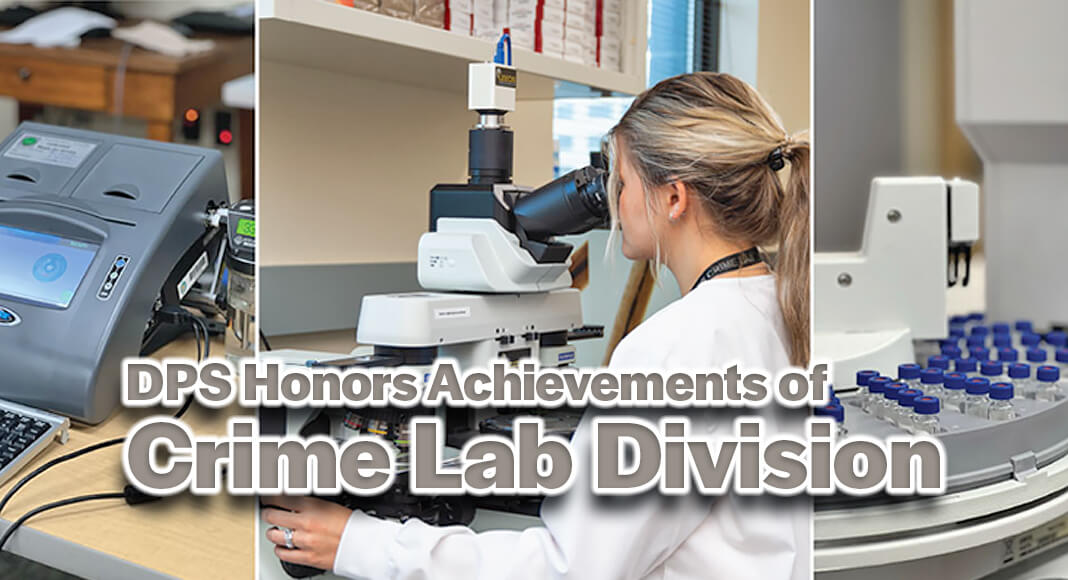
Texas Border Business
AUSTIN – The Texas Department of Public Safety (DPS) recognizes the Crime Laboratory Division’s 2024 achievements in providing expert forensic laboratory and forensic services for the State of Texas, including solving more than 1,000 cases through DNA testing.
“The DPS Crime Laboratory Division plays a crucial role in solving crimes and delivering justice to victims and families across Texas – really the United States,” said DPS Colonel Freeman F. Martin. “From toxicology to DNA to digital and multimedia evidence, the men and women who work in these labs continue to show their commitment to excellence and service through the remarkable strides they have made in the last year. We look forward to building on these successes in 2025.”
| Some of the major achievements of the last year include: |
| In FY 2024, the DPS Crime Laboratory Division helped solve approximately 1,005 cases with the help of House Bill 1399 (86th Legislature) and House Bill 3956 (88th Legislature). HB 1399 required the collection of DNA samples for certain felony arrests. These samples are then run through the Combined DNA Index System (CODIS) Laboratory in Austin and entered into a database to check for possible DNA matches between those arrestees and unsolved cases across the country. HB 3956 expanded the requirement by mandating booking facilities collect a DNA sample from all arrestees charged with a felony class offense occurring on or after Sept. 1, 2023, to help solve cases at the time of an individual’s arrest. |
| In FY 2024, DPS casework laboratories processed, tested and entered 11,764 Forensic DNA samples into the state’s CODIS database to enhance public safety efforts. Additionally, there were1,711 CODIS matches producing investigative leads between the DPS casework labs and other laboratories in Texas and across the country. |
| In FY 2024, the DPS Crime Laboratory CODIS lab processed, tested and entered 47,184 arrestee DNA samples and 18,717 convicted offender DNA samples. These samples contributed to 2,609 in-state CODIS matches and 265 national CODIS matches, producing investigative leads to thousands of unsolved cases. |
| The department transitioned to a direct-to-DNA analysis process for all sexual assault kits (SAK) statewide. Direct-to-DNA is a more sensitive method of analysis and creates a standardized process so that survivors receive identical forensic services regardless of where an offense occurs. |
| The Sexual Assault Evidence (SAE) Tracking Program continues to allow sexual assault survivors to anonymously track and receive updates on the status and progress of evidence. August 2024 marked the conclusion of the fifth year of statewide electronic SAE tracking in Texas. As of Jan. 30, 2025, 55,154 sexual assault kits (SAKs) are being tracked in Track-Kit. |
| DPS continues testing older SAKs that have never previously been submitted to a crime laboratory and had been stored, untested in property rooms across the state. Since March 2022, DPS has completed 1,386 SAKs as part of this project. |
| In December 2024, DPS completed a CODIS review project supporting the Dallas Police Department (DPD) and the Southwestern Institute of Forensic Sciences. In total, DPS Garland completed the CODIS review of 892 DPD kits. |
| In FY 2024, the department released 37,279 blood alcohol reports and the average turnaround time for those cases was 24 calendar days (from time of submission to time of reporting)–allowing investigators to receive testing reports within one calendar month on average. |
| In 2024, the Toxicology (Drugs) backlog was reduced by over 50%. The DPS Crime Laboratory Division used a portion of the $15 million allocated from the 88th Legislature over the biennium to support the reduction. |
| The DPS Crime Laboratory Division is proud to announce the successful completion of its reassessment by the ANSI National Accreditation Board (ANAB). As part of the reassessment process, the Crime Laboratory underwent a comprehensive evaluation of its operations, facilities, personnel and quality management systems against recognized standards. Accreditation is a significant achievement for forensic laboratories across the nation, ensuring that they continue to meet evolving standards of excellence and remain equipped to support law enforcement and legal proceedings with credible and dependable scientific data. |
About DPS’ Crime Laboratory Division
Established in 1937, the DPS Crime Laboratory Division started as a one-chemist operation located at Camp Mabry in Austin. Today, the Crime Laboratory Division has developed into a comprehensive forensic laboratory system with 16 accredited crime labs across the state. The division is now made up of approximately 660 personnel.
| DPS Crime Laboratory Division’s standard areas of analysis include: |
| Trace evidence (i.e., hair, fibers, paint, glass, gunshot residue, impressions, fire debris) |
| Biology/DNA |
| Digital/multimedia evidence |
| Firearms and toolmarks |
| Friction ridge analysis |
| Forensic documents |
| Seized drugs |
| Toxicology |
These services are provided at various labs statewide which are strategically located for optimal access. The support of investigative capabilities is further enhanced by the integration and exchange of local, state, regional and national information via individualizing databases, including the Automated Fingerprint Identification System (AFIS) and the Combined DNA Index System (CODIS).
The Crime Laboratory also includes the Breath Alcohol Laboratory (BAL) and its Office of the Scientific Director (OSD). The BAL and OSD are legislatively charged with administering a statewide judicially acceptable forensic breath alcohol test program for the Crime Laboratory and for programs operating outside of the DPS Crime Laboratory System.
Learn more about DPS’ Crime Laboratory Division here.
###(HQ 2025-014)














